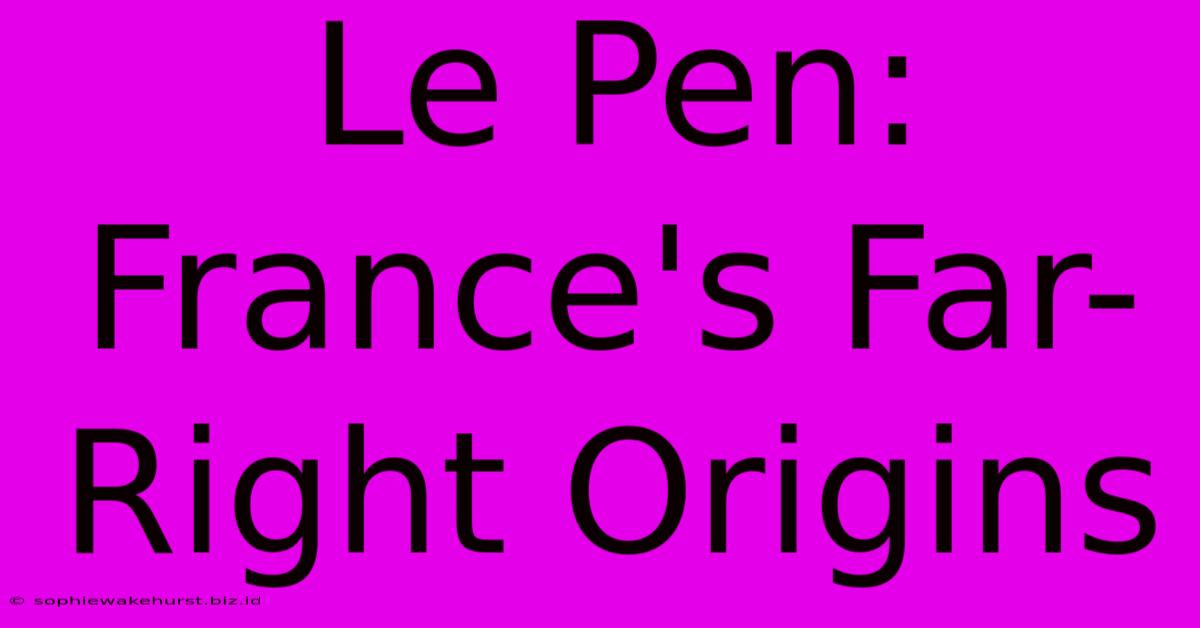Le Pen: France's Far-Right Origins

Discover more detailed and exciting information on our website. Click the link below to start your adventure: Visit Best Website. Don't miss out!
Table of Contents
Le Pen: France's Far-Right Origins
Marine Le Pen's prominence in French politics has brought the country's far-right history into sharp focus. Understanding her rise requires delving into the complex and often controversial legacy of her father, Jean-Marie Le Pen, and the evolution of the National Front (FN), later renamed the National Rally (RN). This exploration reveals a fascinating, albeit troubling, chapter in French political history.
The Founding of the National Front: Jean-Marie Le Pen's Legacy
Jean-Marie Le Pen, a decorated veteran of the Algerian War, founded the National Front in 1972. Initially a fringe party, it gradually gained traction by capitalizing on anxieties surrounding immigration, national identity, and perceived threats to French culture. His rhetoric, often characterized by nationalism, anti-immigrant sentiment, and Euroscepticism, resonated with a segment of the French population disillusioned with mainstream politics.
Key Ideological Pillars of the Early FN:
- Nationalism and Patriotism: The FN cultivated a strong sense of French national identity, often presented as being under siege from external forces.
- Anti-Immigration Stance: The party's hardline stance on immigration, particularly from Muslim-majority countries, became a central tenet of its platform.
- Euroscepticism: The FN consistently opposed closer European integration, advocating for greater national sovereignty.
- Rejection of Political Correctness: The party embraced a confrontational style, openly defying what it perceived as the politically correct consensus.
This combination of factors allowed the FN to tap into a reservoir of discontent, attracting voters who felt ignored or betrayed by the established political parties. Jean-Marie Le Pen's controversial statements and legal battles further cemented his image as a defiant outsider.
From National Front to National Rally: A Strategic Shift
Under Marine Le Pen's leadership, the National Front underwent a significant transformation. While retaining its core nationalist and anti-immigration stances, the party adopted a more polished image, aiming for greater mainstream appeal. This "de-demonization" strategy involved softening some of the party's more extreme rhetoric and focusing on economic issues affecting working-class voters.
Key Changes Under Marine Le Pen:
- Image Refinement: Marine Le Pen sought to distance the party from its more overtly racist and antisemitic past, though controversies continued.
- Broader Appeal: The party broadened its platform to address economic concerns, attracting voters beyond its traditional base.
- Name Change: The rebranding to National Rally (RN) symbolized this attempt at a more modern and palatable image.
- Focus on Economic Issues: Addressing issues such as economic inequality and worker rights, while retaining its anti-immigration stance, showed a more pragmatic approach.
Despite these changes, the core tenets of nationalism and Euroscepticism remained central to the RN's ideology. This strategic shift, however, proved effective in significantly increasing the party's electoral success.
The Continuing Legacy and Future Implications
The rise of Marine Le Pen and the RN highlights the enduring presence of far-right sentiment in French politics. While the party has undergone a strategic makeover, its historical origins and underlying ideology continue to shape its political agenda. Understanding this history is crucial for analyzing the contemporary political landscape in France and its potential implications for the future of the European Union. The ongoing debate surrounding immigration, national identity, and the role of the EU continues to fuel the RN's appeal, and its future trajectory remains a subject of intense scrutiny. The question remains: how far can the RN's image be refined without compromising its fundamental principles? And what will be the long-term consequences of its presence in the French political system?

Thank you for visiting our website wich cover about Le Pen: France's Far-Right Origins. We hope the information provided has been useful to you. Feel free to contact us if you have any questions or need further assistance. See you next time and dont miss to bookmark.
Featured Posts
-
Trumps Vision For A New World Order
Jan 08, 2025
-
Trump To Rename Gulf Of Mexico
Jan 08, 2025
-
Le Pens Journey Colonial Past Far Right Present
Jan 08, 2025
-
Trump Gulf Of Mexico Renamed
Jan 08, 2025
-
How Zuckerberg Pivoted Meta Right
Jan 08, 2025
